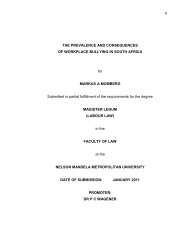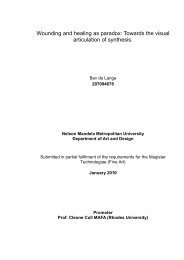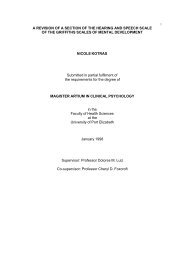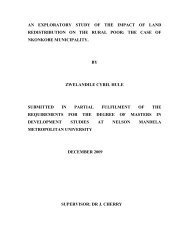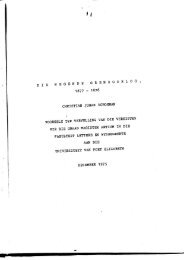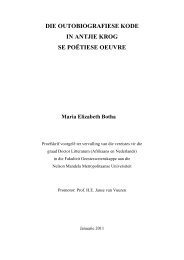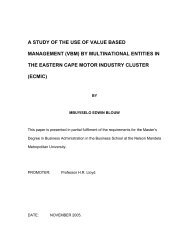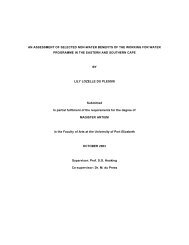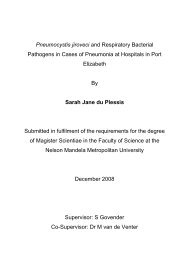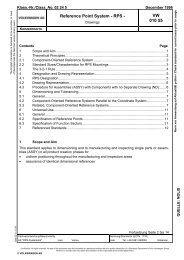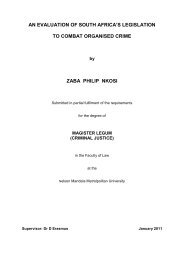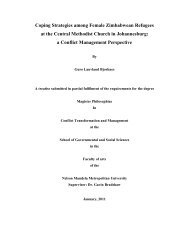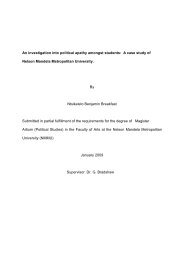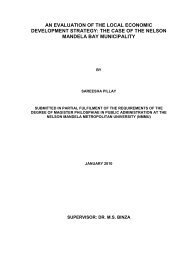Elaine Browne.pdf - Nelson Mandela Metropolitan University
Elaine Browne.pdf - Nelson Mandela Metropolitan University
Elaine Browne.pdf - Nelson Mandela Metropolitan University
Create successful ePaper yourself
Turn your PDF publications into a flip-book with our unique Google optimized e-Paper software.
INTERVIEW WITH FOUR ARTS AND CULTURE TEACHERS FROM THREE DIFFERENT<br />
PRIMARY SCHOOLS<br />
HOW DO YOU EXPERIENCE TEACHING ARTS AND CULTURE IN THE INTERMEDIATE PHASE?<br />
A: Let me try. I think, in the Intermediate phase most of the Arts and Culture syllables or whatever, learning<br />
areas is based on music. We must do music, we must to know that we clap (he clap, clap clap), we do what, we<br />
do warm‐ups and all that. It structures as to do warm‐ups. Have no time for that and the space. We use same<br />
classroom as for the other learning areas. We don’t have a special, special arts class that is designed for doing<br />
things of art and all that stuff. I think I should start there.<br />
Prof Delport: So, so you’re saying that there is a strong, too much focus on music. Is that because it is in the<br />
curriculum as such?<br />
A: Too much focus on music. Yes, yes in the curriculum because the book states every time you must start with<br />
clapping of hands and warming‐up exercises and all that stuff according to our syllabus/structures.<br />
Prof Delport: And then you also feel that the classroom itself is not suitable as such for Arts and Culture.<br />
B: To add more to what is said, from music, when teaching that music, I do have a problem for teaching it<br />
because, I am not trained in music. I have to learn those notes. I don’t know them. I just told my principal that I<br />
would skip this one, just for another day. So I am struggling even to teach the notes I have to do, what. Ja, those<br />
notes for the music that I have to...<br />
A: There are some sevi raps, sevi braps whatever, that chords whatever, ja, crotchets, we do not know them,<br />
really, really I have never seen crotchets in my life. (Laughing)<br />
Prof Delport: Something else? Of the music, itself.<br />
C: It is a problem to us all. I have a problem in teaching a thing I have never seen. I never saw it. Too, so that<br />
when I teach it, I have a problem in teaching something I do not remember. So it is a problem.<br />
Prof Delport: And you?<br />
D: I also got a problem. I don’t know those notes. Those notes ...<br />
Prof Delport: Can I ask you something in music, something else. That is the music theory part. But there are also<br />
other aspects to music, like singing and playing. How do you feel about that? Can you do that? Do you do it?<br />
C: Yes we do it because the learners, they know. Class will sing it but when it comes to moves, they will do it.<br />
A: Ja, ja I can act like that, our music is not structured. We can come off with any kind of music that weren’t in<br />
song, we do what learners will enjoy. Come, come dancing, they will do it. They know the steps.<br />
Prof Delport: When you say our music, are you talking about indigenous music?<br />
A: Yes, yes. Yes, yes.



